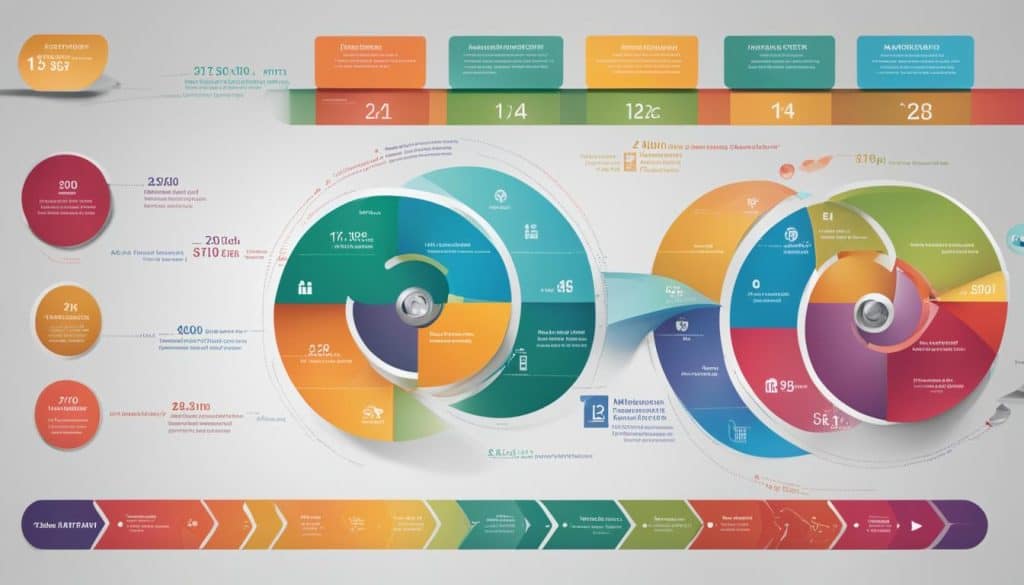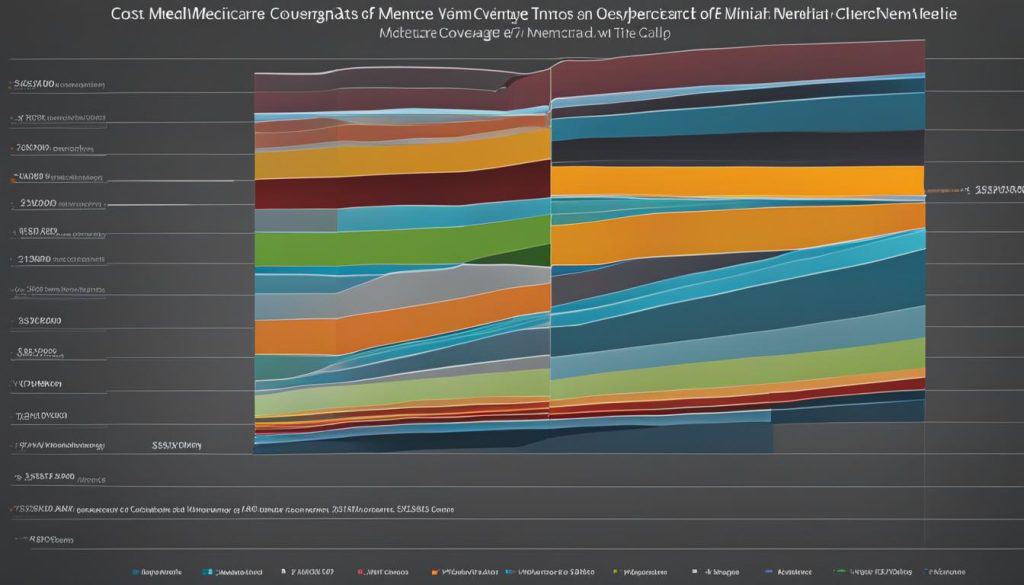As you approach age 65, enrolling in Medicare can be a crucial step to secure adequate healthcare coverage for the golden years of your life. Understanding the enrollment process, eligibility criteria, coverage options, and enrollment periods can be overwhelming, especially for late bloomers in retirement planning.
Integrity Now Insurance Brokers, an independent Medicare agent, presents a comprehensive guide to help you enroll in Medicare after turning 65 successfully. We’ll guide you through each step and provide useful insights to help you make informed decisions about your healthcare coverage.
Whether you’re looking for information on Medicare 101, coverage options, sign-up process, benefits, plans, or avoiding late enrollment penalties, this guide has you covered.
Key Takeaways
- Enrolling in Medicare after turning 65 is essential to secure adequate healthcare coverage for your retirement.
- Understanding the enrollment process, eligibility criteria, coverage options, and enrollment periods can be confusing, especially for late bloomers in retirement planning.
- Integrity Now Insurance Brokers, an independent Medicare agent, presents a comprehensive guide to help you enroll in Medicare successfully.
- This guide covers essential information on Medicare 101, coverage options, sign-up process, benefits, plans, and avoiding late enrollment penalties.
- With this guide, you can make informed decisions about your healthcare coverage and ensure a stress-free retirement.
Understanding Medicare: A Brief Overview
Medicare is a federal health insurance program that provides coverage for individuals aged 65 or older, as well as for younger people with certain disabilities. It consists of different parts, each covering different healthcare services:
- Part A (hospital insurance) covers inpatient care in hospitals, skilled nursing facilities, hospice care, and home health care.
- Part B (medical insurance) covers outpatient services, such as doctors’ visits, preventive care, and medical equipment.
- Part C (Medicare Advantage) includes all the benefits of Parts A and B, as well as coverage for additional services like dental and vision care.
- Part D covers prescription drug costs.
There are various Medicare coverage options available, including Original Medicare and additional plans like Medicare Advantage and Medicare Supplement. Understanding these options is crucial in choosing the right coverage for your healthcare needs.

Medicare is a federal health insurance program primarily designed for people aged 65 or older, people with specific disabilities, and people with End-Stage Renal Disease (ESRD).
To be eligible for Medicare, you must meet certain criteria depending on the plan you choose.
Who Is Eligible for Medicare Part A?
Most people aged 65 or older who are eligible for Social Security or Railroad Retirement benefits are eligible for Medicare Part A at no cost. People under 65 with certain disabilities or with End-Stage Renal Disease (ESRD) may also be eligible for Medicare Part A.
Who Is Eligible for Medicare Part B?
If you are eligible for Medicare Part A, you can enroll in Part B by paying a monthly premium. You are also eligible for Part B if you are under 65 with certain disabilities, have ESRD, or have ALS (Amyotrophic Lateral Sclerosis).
Who Is Eligible for Medicare Advantage and Other Plans?
To enroll in a Medicare Advantage plan or other Medicare plans such as Medicare Supplement (Medigap) plans or Medicare Prescription Drug (Part D) plans, you must meet the eligibility requirements for Original Medicare. In addition, each plan may have specific eligibility criteria that you must meet to enroll.
Integrity Now Insurance Brokers, Inc. is an independent Medicare agent that can help you understand your Medicare eligibility and enrollment options.
Overview of Medicare Enrollment Periods
Medicare enrollment periods are the designated timeframes when you can enroll in Medicare. Understanding these timeframes is crucial to ensure that you enroll at the right time and avoid late enrollment penalties. There are three main enrollment periods for Medicare:
| Enrollment Period | Description |
|---|---|
| Initial Enrollment Period (IEP) | The seven-month period when you are first eligible to enroll in Medicare. |
| Special Enrollment Period (SEP) | A period when you can make changes to your Medicare coverage outside of the designated enrollment periods due to specific circumstances, such as losing employer-sponsored coverage or moving to a new location. |
| General Enrollment Period (GEP) | A period from January 1 to March 31 each year when you can enroll in Medicare if you missed your IEP. |
It’s important to note that the timing of your enrollment can affect your coverage start date, so it’s essential to understand the deadlines for each enrollment period and plan ahead. Integrity Now Insurance Brokers, an independent Medicare agent, can help you navigate the Medicare enrollment process and guide you through the different options available to ensure that you receive the best coverage that aligns with your specific needs.

Signing Up for Medicare: Key Steps to Follow
Enrolling in Medicare is a critical process that requires careful consideration. Here are the key steps you need to follow when signing up for Medicare:
- Gather your documents: You’ll need your Social Security number, proof of U.S. citizenship or legal permanent residency, and your employment history.
- Determine your eligibility: Check your eligibility for Medicare based on your age, disability status, or having certain health conditions.
- Review your Medicare coverage options: Learn about the different Medicare plans available and determine which plan is right for you.
- Complete the enrollment process: You can enroll in Medicare online, by phone, or in person at your local Social Security office.
- Understand your costs: Review your Medicare costs, including premiums, deductibles, and coinsurance, and budget accordingly.
At Integrity Now Insurance Brokers, we understand that the Medicare sign-up and enrollment process can be confusing. As an independent Medicare agent, we can help you navigate the Medicare enrollment process and find the right coverage options for your healthcare needs.

As you approach Medicare enrollment, understanding the different coverage options and benefits is vital for making informed decisions about your healthcare needs. Integrity Now Insurance Brokers, an independent Medicare agent, can help you navigate the complexities of Medicare coverage options available to you.
Original Medicare (Part A and Part B) provides coverage for hospital care, doctor visits, lab tests, diagnostic imaging, and a range of other services. Medicare Advantage plans (Part C) are offered by private insurance companies, often with added benefits such as dental, vision, or hearing care. Medicare Supplement plans (also known as Medigap) can provide additional coverage to fill in the gaps left by Original Medicare. Prescription drug coverage, also known as Part D, can be added to your Original Medicare or Medicare Advantage plan to help cover the cost of prescription medications.
Table: Comparison of Medicare Coverage Options
| Medicare Coverage Options | Coverage | Costs | Added Benefits |
|---|---|---|---|
| Original Medicare | Covers hospital care, doctor visits, lab tests, and other services. | Monthly premiums and out-of-pocket costs. | N/A |
| Medicare Advantage | Covers Original Medicare benefits plus additional benefits such as vision, hearing, and dental care. | Monthly premiums and out-of-pocket costs, which vary by plan. | Added benefits like vision, hearing, and dental care. |
| Medicare Supplement | Helps cover some of the costs not covered by Original Medicare, such as coinsurance, copayments, and deductibles. | Monthly premiums, which vary by plan. | N/A |
| Prescription Drug Coverage (Part D) | Covers the cost of prescription medications. | Monthly premiums, an annual deductible, and out-of-pocket costs. | N/A |
When choosing a Medicare plan, it’s important to consider your healthcare needs, budget, and personal preferences. Integrity Now Insurance Brokers can help you evaluate your options and choose the Medicare plan that best aligns with your unique situation.
Choosing the Right Medicare Plan
If you’re feeling overwhelmed by the different Medicare coverage options, you’re not alone. Fortunately, Integrity Now Insurance Brokers is here to help you make an informed decision. Here are some factors to consider when selecting a Medicare plan.
Costs
The costs associated with each Medicare plan can vary significantly. When comparing plans, it’s important to consider the monthly premiums, deductibles, copayments, and coinsurance. Take a close look at your budget and healthcare needs to determine what level of coverage you can afford.
Network Coverage
Are the healthcare providers you currently visit in-network with the Medicare plan you’re considering? If not, you may be faced with higher out-of-pocket costs. Before selecting a plan, research the network coverage options and make sure they align with your healthcare needs.
Additional Benefits
While Original Medicare includes essential healthcare coverage, additional benefits may be available through Medicare Advantage plans or Medigap plans. These benefits can include prescription drug coverage, dental and vision coverage, and wellness programs. Determine which additional benefits are most important to you when selecting a Medicare plan.
With these factors in mind, you can choose the right Medicare plan for your needs and confidently move forward with your retirement planning.
Medicare Enrollment: Avoiding Late Enrollment Penalties
It is crucial to enroll in Medicare during the designated enrollment periods to avoid late enrollment penalties and gaps in coverage. The consequences of missing these periods can be significant, including paying higher premiums, delays in getting coverage, and limited plan options.
The Initial Enrollment Period is the first opportunity to enroll in Medicare, which begins three months before your 65th birthday and ends three months after your birthday month. If you miss this enrollment period, you can sign up during the General Enrollment Period from January 1 to March 31 each year, but there may be late enrollment penalties. You may be eligible for a Special Enrollment Period if you have certain life events, such as retiring or losing health coverage, which allows you to enroll at different times.
Integrity Now Insurance Brokers, an independent Medicare agent, can help you explore your options and understand the enrollment process. They can assist you in finding a Medicare plan that fits your healthcare needs and budget.
Don’t let late enrollment penalties impact your retirement planning. Contact Integrity Now Insurance Brokers to learn more about your Medicare enrollment options and avoid paying unnecessary fees.

Medicare Open Enrollment Period
If you already have a Medicare Advantage plan or a Part D prescription drug plan, the Medicare Open Enrollment Period (OEP) gives you the opportunity to review, make changes, and switch plans during a specific time of year. The OEP runs from October 15 to December 7 of each year.
During this period, you can:
- Switch from Original Medicare to a Medicare Advantage plan, or vice versa
- Change from one Medicare Advantage plan to another
- Enroll in a Part D prescription drug plan if you didn’t during your Initial Enrollment Period
- Switch from one Part D plan to another
- Drop your Part D plan altogether
It is important to note that any changes made during the OEP will not take effect until the following year, on January 1st. So, it’s crucial to carefully consider all options and review the plan details to ensure it aligns with your healthcare needs.

Special Enrollment Periods for Medicare
While the general enrollment periods for Medicare only occur once a year, you may qualify for a Special Enrollment Period (SEP) that allows you to make changes to your Medicare coverage outside of the designated enrollment periods. SEPs are triggered by specific life events, such as:
- Retirement from a job that provided healthcare benefits
- Loss of healthcare coverage due to job loss or changes in your spouse’s employment status
- Relocation to a new state with different Medicare plan options
- Changes in your Medicaid eligibility status
- Enrollment in employer-sponsored retiree health coverage
If you experience any of these events, you may be eligible for a SEP, allowing you to enroll in a new Medicare plan or make changes to your existing coverage. It’s important to note that some SEPs have specific timeframes in which you must make changes to your coverage, so be sure to act quickly if you’re eligible.
As an independent Medicare agent, Integrity Now Insurance Brokers can help you navigate your Medicare coverage options and determine if you qualify for a Special Enrollment Period. Contact us today to learn more.

Understanding Medicare Costs and Financial Assistance
When enrolling in Medicare, it’s essential to understand the costs associated with your plan. Medicare costs can vary depending on the type of plan, coverage, and enrollment period. As an independent Medicare agent, Integrity Now Insurance Brokers can help you navigate the financial aspects of Medicare coverage to ensure you’re making an informed decision.
Medicare Costs
There are different costs associated with Original Medicare, Medicare Advantage, and Medicare Prescription Drug Plans. Below is a breakdown of the potential expenses:
| Part of Medicare | Costs |
|---|---|
| Medicare Part A (Hospital Insurance) | Usually no premium, but deductibles and coinsurance apply |
| Medicare Part B (Medical Insurance) | Monthly premium, deductible, and coinsurance apply |
| Medicare Part C (Medicare Advantage) | Monthly premium, deductible, and additional costs depending on the plan |
| Medicare Part D (Prescription Drug Coverage) | Monthly premium, deductible, copayments and coinsurance apply |
It’s important to note that some Medicare plans may offer lower premiums but increased costs in other areas. Understanding these expenses can help you compare plans and choose the best option for your budget and healthcare needs.
Financial Assistance Programs
For individuals who face difficulty paying for their Medicare coverage, financial assistance programs are available. These programs can help cover the costs of premiums, deductibles, and copayments. Some of the available options include:
- Medicare Savings Programs
- Extra Help (Low-Income Subsidy) for Part D
- PACE (Programs of All-Inclusive Care for the Elderly)
- Medicaid
Integrity Now Insurance Brokers can help you determine your eligibility for these programs and guide you through the application process.
Don’t let the financial aspect of Medicare overwhelm you. By understanding the potential costs and financial assistance programs available, you can make informed decisions and ensure you have the right coverage for your retirement.

Conclusion
Enrolling in Medicare after the age of 65 can be a daunting process, but with the right information, you can make informed decisions to secure the best healthcare coverage for your retirement. Remember, it is never too late to enroll in Medicare and make sure you are covered. At Integrity Now Insurance Brokers, we provide professional guidance to help you navigate the enrollment process and choose the right Medicare plan for your needs.
By following the steps outlined in this guide, you can understand the enrollment options, eligibility criteria, coverage choices, and key enrollment periods. Don’t wait any longer, enroll in Medicare after 65 and secure your healthcare needs. Contact us today to learn more about the enrollment process and get started on your retirement planning journey.
Thank you for choosing Integrity Now Insurance Brokers, your trusted independent Medicare agent.
FAQ
How do I enroll in Medicare after turning 65?
To enroll in Medicare after turning 65, you can sign up during the Initial Enrollment Period, which begins three months before your 65th birthday and ends three months after. You can apply online on the official Medicare website or visit your local Social Security office.
Who is eligible for Medicare?
Most individuals aged 65 or older are eligible for Medicare. Additionally, individuals under 65 with certain disabilities or end-stage renal disease (ESRD) may also qualify for coverage.
What are the different parts of Medicare?
Medicare is divided into four parts: Part A covers hospital insurance, Part B covers medical insurance, Part C offers Medicare Advantage plans, and Part D provides prescription drug coverage.
When can I enroll in Medicare?
You can enroll in Medicare during the Initial Enrollment Period, which is seven months long and starts three months before your 65th birthday. If you miss this period, you can also enroll during the General Enrollment Period, which runs from January 1st to March 31st each year.
How do I choose the right Medicare plan?
Choosing the right Medicare plan depends on your specific needs and preferences. Consider factors such as costs, coverage options, provider networks, and additional benefits offered by Medicare Advantage and Supplement plans.
What is the Medicare Open Enrollment Period?
The Medicare Open Enrollment Period, also known as the Annual Election Period, occurs from October 15th to December 7th each year. During this period, you can make changes to your Medicare Advantage or Part D prescription drug plans.
Are there any penalties for late enrollment in Medicare?
Yes, there can be penalties for late enrollment in Medicare. If you don’t enroll during your Initial Enrollment Period and don’t have other creditable coverage, you may have to pay a late enrollment penalty when you do enroll, and your coverage may be delayed.
What is a Special Enrollment Period?
A Special Enrollment Period allows you to make changes to your Medicare coverage outside of the standard enrollment periods. Qualifying events, such as moving, losing other coverage, or eligibility changes, may trigger a Special Enrollment Period.
What are the costs associated with Medicare?
The costs associated with Medicare include premiums, deductibles, copayments, and coinsurance. The specific amounts can vary depending on the type of Medicare plan you choose and your income.
Are there financial assistance programs available for Medicare beneficiaries?
Yes, there are several financial assistance programs available to help Medicare beneficiaries with their healthcare costs. These include Medicaid, Medicare Savings Programs, Extra Help for prescription drugs, and state-specific programs.










